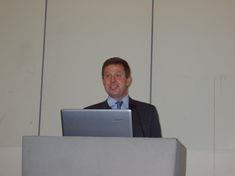
UK farmers are being asked to provide modern farming solutions using antiquated methods, according to Richard Hirst of the National Farmers’ Union (NFU) - and that could stunt the industry’s potential for future growth.
Hirst, who is chairman of the NFU’s horticulture board, said: “We are being asked to provide 21st century solutions using 19th century tools, and I know of no other industry in this country being asked to do that.”
There is a wealth of new and diverse opportunities for UK growers to seize in today’s increasingly food-conscious world, according to Hirst, including recognition of the issue of food security, realisation of the importance of fresh produce in improving the nation’s diets, local sourcing and climate change - but a number of key stumbling blocks could curtail future growth.
The single biggest issue facing UK farmers is lack of research and development, said Hirst. “Why on earth doesn’t DEFRA have anything to do with productive agriculture or horticulture?” he asked. “Any R&D now conducted has to be fuelled by the farming community and spread over 300 crop types.
“The R&D base in this country is under huge threat - in two to three years we may have only one site left. When we need to work on so many issues, why is the rug being pulled from under us?
“The government’s food security report released this summer has made people realise it is an issue - the government might revise its targets and hopefully some money will come back to farmers for R&D to do some good.”
Scant availability of labour and escalating input costs are also causing headaches for growers, and Hirst called for retailers to recognise the risks they face. “We are expected to produce good-quality food at 1990s prices, but it won’t happen.”
Regulatory burdens from Brussels, including the proposals on Plant Protection Products Directive 91/414, the Water Framework Directive and the Soil Directive, will also decrease the productivity of domestic production and force the country to further rely on imports, said Hirst. “There is no concern from the regulators in Brussels about the impact of these proposals. They don’t understand the impact they will have - we’ll end up importing food treated with the very chemicals we have been banned from using. This will just push up the cost of food.
“We have a great opportunity to help with climate change - we can be part of the solution. But we need regulation that helps us, and modern tools of production.”
Hirst called for NFU members to have as great an opportunity as possible to market their product in the UK. “I accept that we must help growers in other countries and the UK has always imported products- but we must have the chance to sell more of what we grow in the UK, given the restrictions of our climate.
“Growers can provide some of the solutions to society’s biggest problems - as long as they are equipped with modern tools and freed of excess bureaucracy,” he added.



